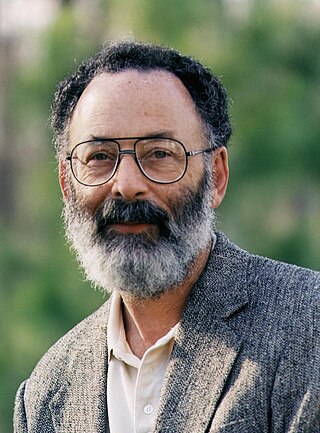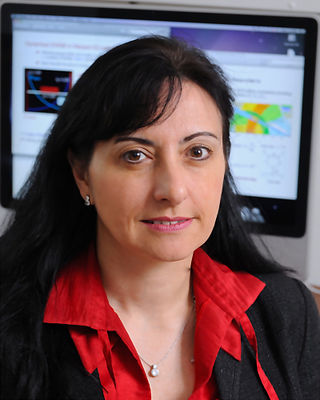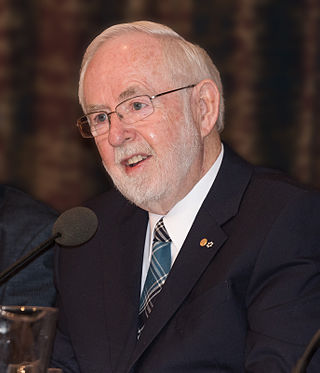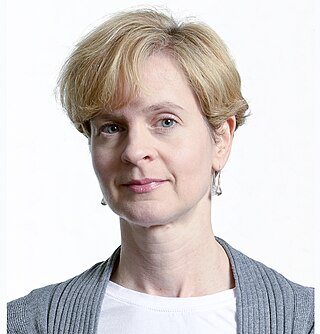
The Large Hadron Collider (LHC) is the world's largest and highest-energy particle collider. It was built by the European Organization for Nuclear Research (CERN) between 1998 and 2008 in collaboration with over 10,000 scientists and hundreds of universities and laboratories across more than 100 countries. It lies in a tunnel 27 kilometres (17 mi) in circumference and as deep as 175 metres (574 ft) beneath the France–Switzerland border near Geneva.

The Natural Sciences and Engineering Research Council of Canada is the major federal agency responsible for funding natural sciences and engineering research in Canada. NSERC directly funds university professors and students as well as Canadian companies to perform research and training. With funding from the Government of Canada, NSERC supports the research of over 41,000 students, trainees and professors at universities and colleges in Canada with an annual budget of CA$1.1 billion in 2015. Its current director is Alejandro Adem.

The International School for Advanced Studies is an international, state-supported, post-graduate-education and research institute in Trieste, Italy.

Nathan Isgur was a theoretical physicist from the U.S. and Canada.

Ishfaq Ahmad KhanSI, HI, NI, FPAS, was a Pakistani nuclear physicist, emeritus professor of high-energy physics at the National Centre for Physics, and former science advisor to the Government of Pakistan.

François, Baron Englert is a Belgian theoretical physicist and 2013 Nobel Prize laureate.

Marcela Silvia Carena Lopez is an Argentine theoretical physicist, and distinguished scientist at the Fermi National Accelerator Laboratory in Batavia, Illinois, where she is also head of the lab's Theory Division. She is also a professor at the University of Chicago, where she is a member of the Enrico Fermi Institute and the Kavli Institute for Cosmological Physics.

Arthur Bruce McDonald, P.Eng is a Canadian astrophysicist. McDonald is the director of the Sudbury Neutrino Observatory Collaboration and held the Gordon and Patricia Gray Chair in Particle Astrophysics at Queen's University in Kingston, Ontario from 2006 to 2013. He was awarded the 2015 Nobel Prize in Physics jointly with Japanese physicist Takaaki Kajita.

Alan Astbury (1934–2014) was a Canadian physicist, emeritus professor at the University of Victoria, and director of the Tri-Universities Meson Facility (TRIUMF) laboratory.
The Deep Underground Neutrino Experiment (DUNE) is a neutrino experiment under construction, with a near detector at Fermilab and a far detector at the Sanford Underground Research Facility that will observe neutrinos produced at Fermilab. An intense beam of trillions of neutrinos from the production facility at Fermilab will be sent over a distance of 1,300 kilometers (810 mi) with the goal of understanding the role of neutrinos in the universe. More than 1,000 collaborators work on the project. The experiment is designed for a 20-year period of data collection.

The Pacific Institute for the Mathematical Sciences (PIMS) is a mathematical institute created in 1996 by universities in Western Canada and the Northwestern United States to promote research and excellence in all areas of the mathematical sciences. It provides training and support for graduate students and post-doctoral researchers hosted at member institutions. It also supports visiting researchers and hosts events ranging from individual lectures to multi-year "collaborative research groups (CRGs)" in the mathematical sciences. Additionally, PIMS has a large educational outreach program aimed at promoting mathematics at all levels but with particular focus on primary and secondary levels (K–12).
Anthony William (Tony) Thomas is an Australian physicist, Professor of Physics at the University of Adelaide since 1984 and Elder Professor of Physics since 1990.

Paolo Giubellino is an experimental particle physicist working on High-Energy Nuclear Collisions. Currently he is the joint Scientific Managing Director of the Facility for Antiproton and Ion Research (FAIR) and the GSI Helmholtz Centre for Heavy Ion Research (GSI) and Professor at the Institute of Nuclear Physics of the Technische Universität Darmstadt.
Physics outreach encompasses facets of science outreach and physics education, and a variety of activities by schools, research institutes, universities, clubs and institutions such as science museums aimed at broadening the audience for and awareness and understanding of physics. While the general public may sometimes be the focus of such activities, physics outreach often centers on developing and providing resources and making presentations to students, educators in other disciplines, and in some cases researchers within different areas of physics.

Wendy Taylor is an Experimental Particle Physicist at York University and a former Canada Research Chair. She is the lead for York University's ATLAS experiment group at CERN.
Elena M. Bennett is an American ecosystem ecologist specializing in studying the interactions of ecosystem services on landscape. She is currently a Professor and the Canada Research Chair in Sustainability Science at McGill University. She was inducted to the Royal Society of Canada’s College of New Scholars, Artists, and Scientists in 2017. She was elected a member of the National Academy of Sciences in 2022 and became a Guggenheim Fellow in the same year.
Sinéad M. Ryan is an Irish theoretical physicist and professor of Theoretical High Energy Physics at Trinity College Dublin. Her research covers "high-energy particle physics, and how particles in atoms such as quarks and gluons stick together".
The European Strategy for Particle Physics is a prioritisation of European ambitions to advance particle physics science for the long-term future and is the cornerstone of Europe’s decision-making process in the field. The European Strategy is mandated by the CERN Council, and is formed through a broad consultation of the grass-roots particle physics community. The opinions of physicists from around the world are actively solicited and the European Strategy is developed in close coordination with similar processes in the US and Japan in order to ensure coordination and optimal use of resources globally.
The Snowmass Process is a particle physics community planning exercise sponsored by the Division of Particles and Fields of the American Physical Society. During this process, scientists develop a collective vision for the next seven to ten years for particle physics research in the US.













